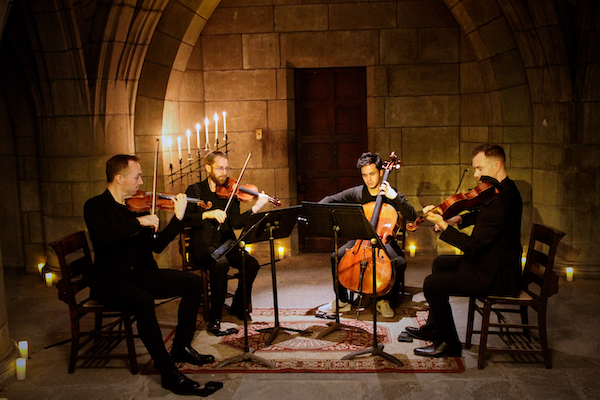Personal and public, John Luther Adams’ new work rises from the crypt

There are plenty of performance spaces that have an special extra-musical quality, like the view from Bargemusic or the atmosphere at the Temple of Dendur in the Metropolitan Museum of Art.
Yet there are performances where the music makes its strongest impact in a particular place, one that best expresses that place. Such was the case Monday night, when JACK Quartet filled the crypt under the Church of the Intercession with the music of John Luther Adams; his The Wind in High Places and the New York premiere of Lines Made by Walking.
The concert was part of the Crypt Sessions series, presented in the small, classic ribbed vault down a set of steep stone steps under the church. It is one of the finest small venues in the city, with a dreamy acoustic and a true and natural feeling of intimacy—even with several dozen people in the seats, it feels like a living room.
The series has offered consistently fine programming that mixes classics, modern, and contemporary music. Yet Monday night’s concert was the first that transformed the crypt from a great place to experience a concert to an ideal setting for the music.
Not only did everything sound fabulous—the resonance of the space seems perfect for a string quartet, adding an extra fullness to the sound and blending the instruments into a shining emulsification with no loss of texture or detail— but in the crypt, a timeless space closed off from the world, there was no mediation between composer, musicians, and audience.
Adams’ music is now performed regularly in the concert hall but never seems of that world. If Debussy’s impressionism is that of transforming an experience into a masterpiece by Seurat on a museum wall, Adams’ manner is that of Thoreau—to be in a place, incorporate it into his memory and values, and recreate that through music. It misses the point to say he is inspired by nature—Adams is changed by nature and his music is a catalogue of the places that changed him.
The Wind in High Places is just what the title says, a recreation of the experience of different summits. With the quartet playing harmonics on the open strings, Wind turns the ensemble into a living wind harp, where the key feature is not the strings but the musicians themselves. Like the wind, the music builds from nothing, rises, falls, drifts away. But with the feedback from the space—the reflection making for the sensation of continuous activity, even at rests—and from the social and emotional presence of the close-in audience, the music went deep. As the first movement flowed into the second, one had the feeling that the wind was flowing around the musicians, animating them as much as they were creating it.
There is something different, though, about Lines Made By Walking. It is a natural companion to The Wind in High Places, but sounds like a new, more personal story.
Lines came out of the composers’ morning walks in Montana. The premise is simple—a climb up, a pause, and a descent. Both the notes and the energy rise, hold steady, then let go with a sense of both fatigue and satisfaction.
In the performance, the place was less Montana and more Adams’ internal life—this is his most intimate music making to date. And though the piece has his familiar steady, measured determination, it seemed more anxious and thus more moving.
As JACK played with a wide, plangent sound, one felt the piece was a profound statement about existentialism. Adam made his temporary marks along the trails, and the sounds that came out of his mind and body were striving to leave their own marks on the universe. Each musical statement was beautiful and forceful, while also wrapped in a feeling of loss, an intense and clear thought about how life is a temporary state that ends in loss.
This was poignant and powerful music that shouts into the canyon and wonders if an echo, or something, will return. Beyond its sheer beauty, doing just that makes Adams an important and necessary musician for our time.
Pianist Matan Porat performs 7 p.m., November 19, in the Crypt Sessions. deathofclassical.com